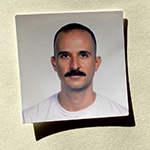TIERRA O MUERTE
The seasons were punctuated by extremes. Long, bitter winters with endless snowfall and hot, summer days giving way to monsoon and torrential downpour. Though they called it a valley it was really a slope, an upland mesa, formed by erosion over millions of years, since the earliest days of the planet’s existence, carving out mountains and cliffs made of metamorphic rock, rugged and craggy, casting deep shadows when sunlight descended below the horizon.
And the sun shone a lot. The land was first green though eventually they named it yellow. But it was also often golden, when the aspen trembled and changed colors beside the spruce and evergreen. Truthfully, the land was mostly brown. A color no one likes to talk about. Rich with mineral, viscose and muddy. The animals certainly didn’t care: grazing even-toed ungulates that were splendidly horned, packs of canines, and birds aplenty.
Many people were born there but more just showed up, or were brought – by their husbands, or as captives, or forced by the will of their god. They claimed, and intended to cultivate the soil but over time only choked it with tillage and crops, stealing water and making dams, with beasts of burden trampling the land. Eventually boundaries were drawn, barriers arbitrary and destructive, gifted by monarchs on other continents. Those who were born there defended it but the boundaries changed hands, different owners maybe but still the same old thing.
The people blended and blended and forgot how they started. Names and cultures persisted but many more were eradicated. Isolation was pervasive. And most of those who remained never thought that inaction was a form of collusion. A courthouse was built, emulating a society purporting to rid itself of excess, without ornamentation, with the insistence that empire was the birthplace of living. A new identity mounted under the banner of freedom, flagpoles proudly displaying their inclusion into a culture that does not want them.
Nowadays it’s a ruin – just decrepit, old houses forgotten. A ballroom with no ceiling. A barn that’s collapsing. The people used to proclaim, Land, or death. But I think it might be and.
Dowsing
July fizzles. It languishes and snaps, then ends, again and again. So you pursue moisture. Rippling off of your skin, packed into venues, incessantly sweating. You are overdressed and ashamed to be wet. But you’ll never be younger and just love to dance.
Dive into the ocean, its warm buoyant waters. Trust your body to float; become the girl from Ipanema. It curls around and within, lowering defenses, letting a man suck on each of your toes. But spit is mostly water too, so be careful. Sickness follows you.
It surrounds you. Nearly eight-hundred thousand gallons at once. But it’s still not enough. So you hunker down and stay in one place where the tap water is celebrated, traveling through pipes where there’s nothing to waste.
But you’re restless, you know. You head north to the tides, sinusoidal and flat, to a place like New Brunswick that gives while it takes. Learn what it means to prevent your escape.
Choose to go without and retreat back to drought. Take it wherever it can be found. Watering holes, brackish and green. Sneaking into hotel swimming pools. The Sunset Marquis. You try not to be seen. House-sitting. Your high school friend’s wedding, cigars and cheeseburgers in a jacuzzi.
Some islands unnerve you, saline reminders of absence, while glacial lakes fold and envelope, water too cold to provide for your body.
But eventually you learn how to make do with what’s what. Shorter showers. Less is okay – it’s still a lot. Daily hydration, don’t forget. You are a fish with horns. Sweat is just sweat.
Some merciful rivers continue to flow, cascading off granite – reminders each summer that you are a visitor still. And when July returns, you come to a hole, jack-hammered through a foundation, and are told all about an artesian well. Sources of water that can be nearly infinite. And you stop to think, Can you believe it? Abundance.

Greg Luna (he/him) is a queer Chicano writer and filmmaker. His work has been supported by the Kenyon Review, Tin House, i-D Magazine, Interview Magazine, and NewFest: The New York LGBTQ+ Film Festival. He is a graduate of the Kanbar Institute of Film & Television at NYU’s Tisch School of the Arts and lives in Los Angeles. He is currently at work on his first novel: an intergenerational family saga set in the American Southwest. He can be found on Twitter at @gregluna.

 BACK TO ISSUE
BACK TO ISSUE